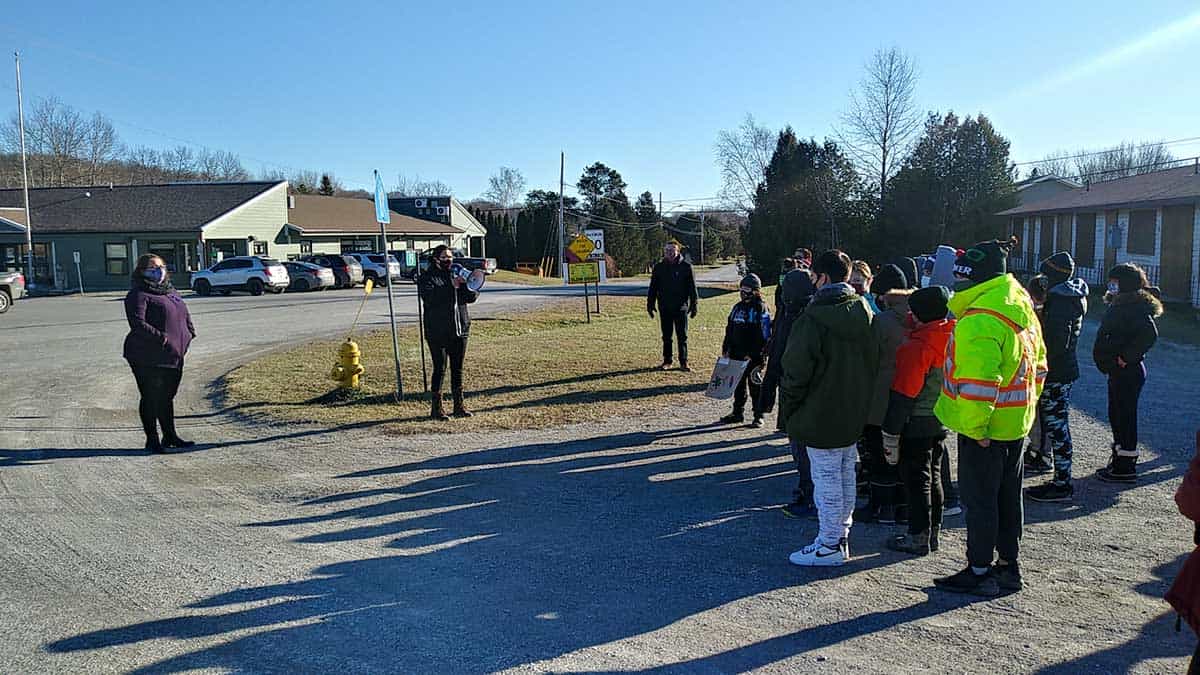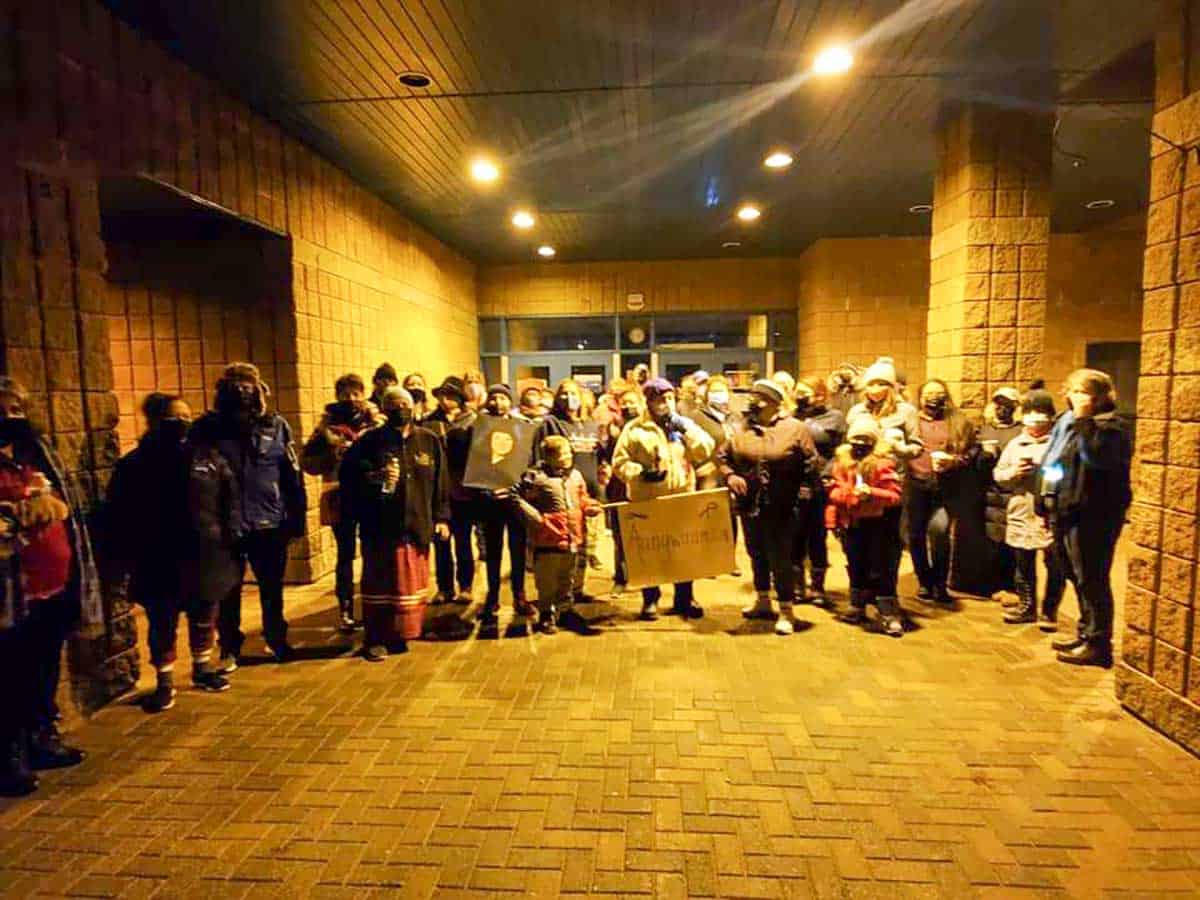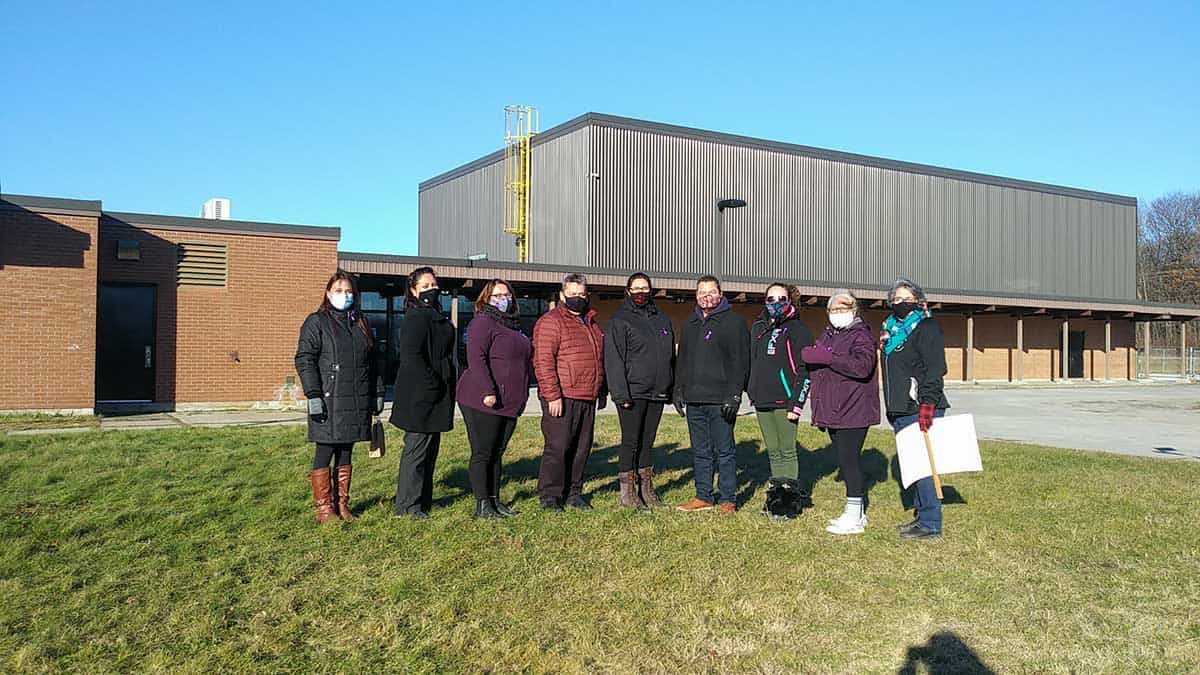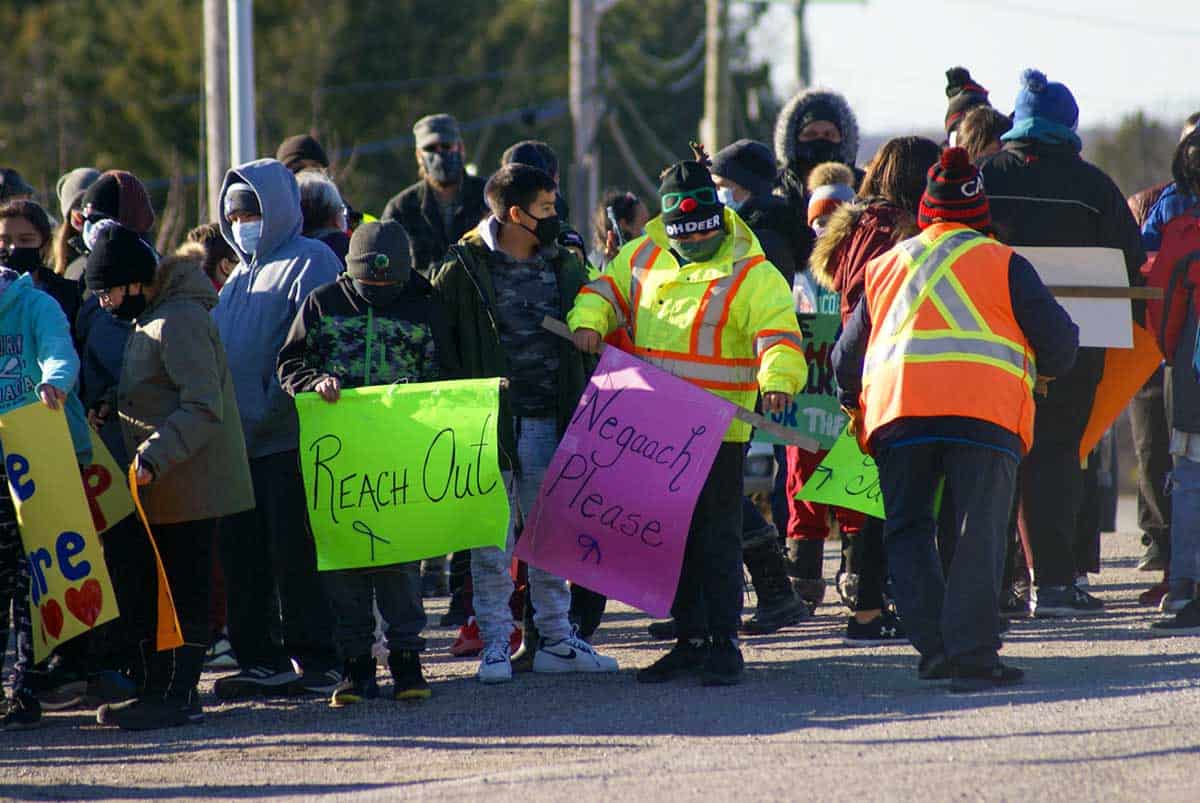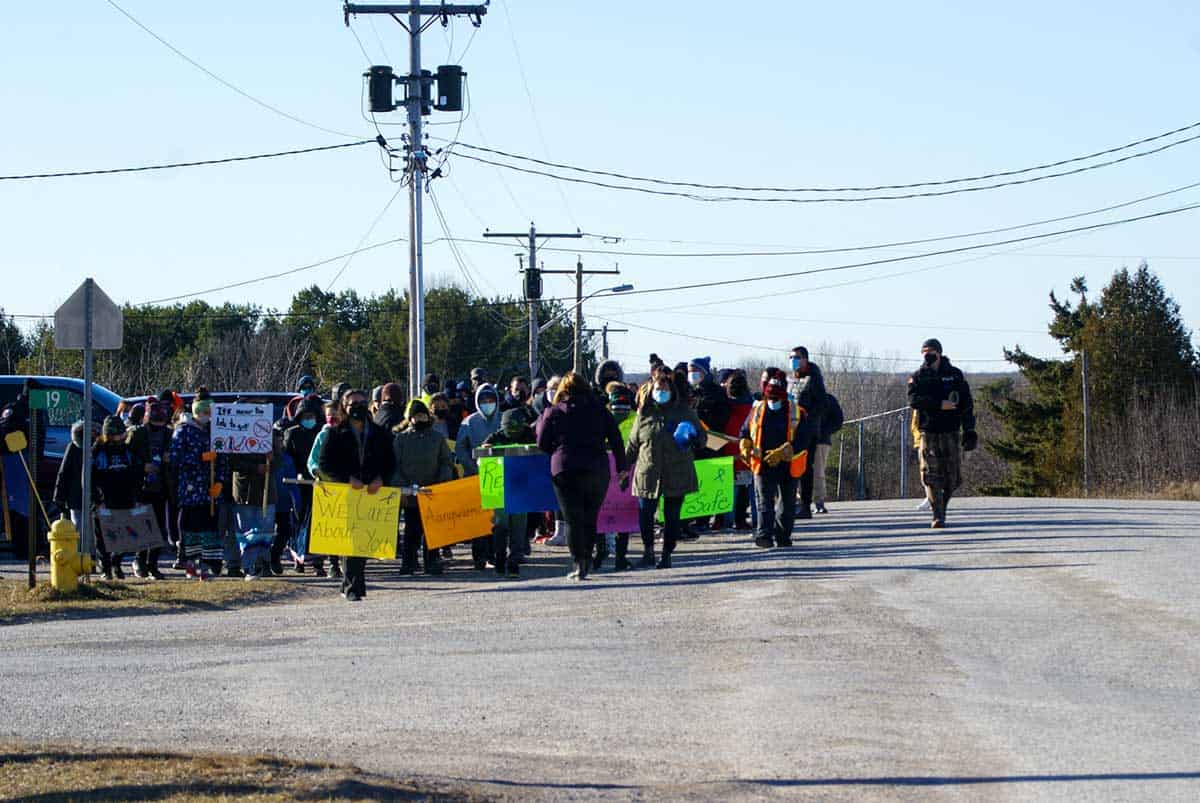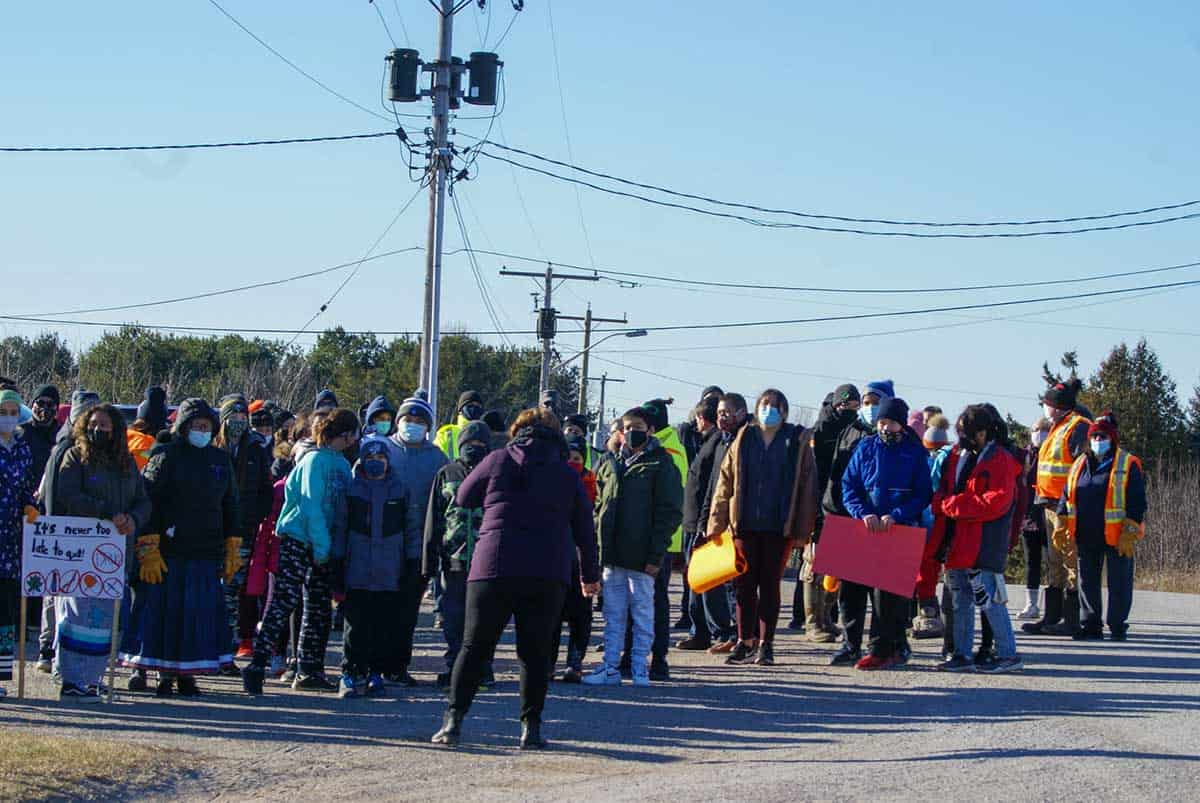M’CHIGEENG – Six weeks ago, six women met in a kitchen in M’Chigeeng to discuss what they could do. All were grieving lives lost too early to opioid or other substance overdose. They were family members or community members. “We all have a personal connection one way or another and we really saw it as an opportunity. There were six of us sitting around a kitchen table wondering what we could do and this was it,” said group spokesperson Kim Aelick.
Ms. Aelick was grappling with the loss of a community member that she never would have thought would have a concern with drug use. “If it can happen to them it can happen to anybody. Every socio-economic class, every seemingly well put together individual.” Participation in the group and the walks provides a way of dealing with her grief and “just coming to terms with the fact that this individual was gone.”
‘It’ began with two community memorial walks, on November 25 and December 2. There were 37 people at the first walk and 78 at the second. “We had two goals,” Ms. Aelick said. “To raise awareness of the concern about drugs in our community and we saw it as an opportunity to provide Naloxone kits as well.” They have handed out 14 kits so far. “If even one of those 14 saves someone’s life from being cut short, we feel we’ve been successful.”
It’s about breaking down the stigma, she said. People need to know that it’s okay to ask for help. “We have to be realistic that drugs are here, unfortunately. What can we do to support each other?”
The group, which calls itself Legendary, reached out to M’Chigeeng chief and council for support as well as several health services and the UCCM Anishinaabe Police Service. The effects of substance use within the community have been devastating, touching all community members in one way or another, they wrote. “Substance abuse and drug use increases the likelihood of developing addictions. The earlier people drink or use drugs, the greater the risk of developing problems with binge drinking or substance use disorders. Drug and alcohol consumption also have a significant impact on issues with violence, suicide and mental illness, which are all closely interconnected and each condition exacerbates the others.”
The women shared how their own feelings of helplessness and grief led to the formation of their small group in an attempt to support positive change and shed light on the challenges faced by the community. “We hope to shed light on the issue and identify that support is available within our community,” they wrote, inviting the M’Chigeeng Health Centre and chief and council to support their initiative by joining one of the scheduled walks.
“Chief and council are leaders who have been chosen because of their capability to make important decisions on behalf of the community and in order to do this they must be good listeners. Please join in and listen to the pain and grief our community is experiencing,” the letter stated.
They noted that while positive decisions have been made for the community in respect to COVID-19 and successfully challenging the pandemic, drugs and substance use requires just as much attention, if not more. “Leadership foresight is crucial in anticipating the outcome and how that decision impacts the rest of the community.”
Leadership responded to Legendary’s request: the December 2 walk saw participation by staff and students of Lakeview School, Mnidoo Mnising Crisis Response Team, UCCM Anishinaabe Police Service, OPP Provincial Liaison Team, Wiikwemkoong addictions worker Tim Ominika as well as elders, citizens, staff members of M’Chigeeng First Nation and Ogimaa-kwe Linda Debassige.
“It was an honour to again participate in the second memorial walk organized by the grass roots group, Legendary,” said Ogimaa-kwe Debassige. “It is wonderful to see such a movement that is working towards increasing awareness with respect to mental health and addictions. It was especially important and also inspiring to have our students of Lakeview School to participate and support this movement; after all they are our future leaders of this community.”
“It is important to end the stigma surrounding addictions and mental health and walks such as these demonstrate the love and kindness that our citizens have for our community,” she said. “Our citizens are the social fabric of our community and our citizens are our family. When any one of our family members experience challenges around mental health and addictions, it impacts us all. It is vitally important that we stand together and show our citizens that we care.”
“With the onset of the COVID-19 pandemic, we are facing increased challenges as it relates to mental health and addictions. Our health services department continues to work diligently in helping members of our community in mental health, addictions and wellness,” she added.
The December 2 walkers gathered at Lakeview School at 2 pm. Following words from Ogimaa Debassige, Tim Ominika spoke. “It’s very important to be here and to be a part of this,” he said. “We’re all doing this because of you. We’re all doing this to raise awareness and everybody has to come together to address these issues. Nobody’s alone while we are doing this. We want to make sure all of us are supported and by having your ogimaa here as leader of your community, it shows how much support all of you have. I’m very grateful to be here and to be a part of this. Nobody is left alone,” he said.
UCCM Police blocked traffic on Highway 551 for the duration of the walk, which started and ended at the school. A chorus of horns from the stopped vehicles demonstrated additional support for the initiative.
Ms. Aelick was pleased with the turnout. “We have community members here. We have young people here. We’re teaching the young people as well. We can’t wait until high school,” she said. “But it’s important to educate adults too. It could be an older person who gets their meds mixed up. That Narcan kit is so important. We need to get rid of the stigma so people don’t feel ashamed to ask for help. It only takes 10 minutes of training (to use the kit) and it’s free.”
The Legendary group continues to meet every Monday. They walk through different areas of the community at different times, offering support and Naloxone kits. Overdoses happen any time of day, they said, and anywhere.
M’Chigeeng First Nation is stepping up as well, having mandated a revitalization of the M’Chigeeng Drug Strategy, said Ogimaa Debassige. To date several meetings have been held. They group is working in partnership with the UCCM Police Service and other external groups to create a strategy that will roll out in the near future.
“It is of utmost importance that our strategy contain a wholistic approach providing necessary supports for our citizens 24/7 and is inclusive of those individuals within our community who wish to be a part of this movement,” she said. “We will continue to support all efforts and work towards the wellness of our community for a better tomorrow on behalf of our future leaders today.”



